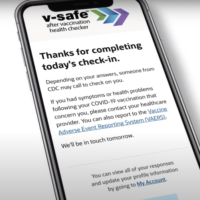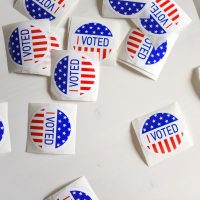A man armed with a hammer broke into the home of House Speaker Nancy Pelosi and fractured the skull of her husband, Paul. Some conservative figures — including Donald Trump Jr. — have shared social media posts claiming with no evidence and contrary to police reports that the man was a prostitute known to Paul Pelosi. He wasn’t.
FactCheck Posts
Viral Video Spouts Baseless Claim About Early Voting in Arizona
Millions of Arizona voters requested ballots to vote early in the 2022 election. Early voting results cannot be released until after the election, and ballot security measures prevent widespread voter fraud. Yet a viral video advises Republicans not to vote early, making the baseless claim that it could show Democrats how many votes they need “to fake” to win.
Posts Distort Misleading Analysis of COVID-19 Vaccine Safety Data
A rigorous vaccine safety monitoring system has shown that the COVID-19 vaccines are safe and only rarely have serious side effects. But an article shared on social media falsely says that CDC data show more than 18 million people “were injured so badly” by a Pfizer/BioNTech or Moderna COVID-19 vaccine “that they had to go to the hospital.”
Flu Vaccines Given to Prevent Disease, Not Just to Support Pandemic Vaccine Manufacturing
Social Media Post Misrepresents Connecticut Ballot Question on Early Voting
A ballot question in Connecticut asks voters if they want to enact early voting. But a social media post falsely claims the proposal would also “remove the requirement of a certified seal from certain ballots.” The measure refers to removing a seal on a list of election results and has nothing to do with ballots.
Altered Video of Exchange Between White House Press Secretary and Reporter on Gas Prices Goes Viral
In an Oct. 19 press briefing, White House Press Secretary Karine Jean-Pierre answered Fox News correspondent Peter Doocy’s question about President Joe Biden’s request for U.S. oil companies to help lower gasoline prices. However, a viral video of that exchange was edited to make it appear that Jean-Pierre ignored Doocy’s question.
Kansas State Art Funding Distorted as ‘Drag Shows for Children’ in Governor’s Race
Fabricated Screenshot Misrepresents GOP’s ‘Commitment to America’
House Republicans unveiled a list of policy goals called the “Commitment to America” in September. But a fabricated screenshot purporting to show the agenda has been circulating on social media. None of the items included in the image come from the agenda — although some echo proposals made by the conservative Republican Study Committee.
GOP’s Shaky Claims About Cortez Masto’s Net Worth
A Republican TV ad accuses Nevada Sen. Catherine Cortez Masto of putting her “own financial interests over yours” and “becoming a multimillionaire while in office.” But the claims rely on financial disclosure reports that provide only broad ranges of assets and liabilities and show no evidence of wrongdoing.
Misleading Attack About Democrats and Criminal Immigrants
Every Democrat – and some Republicans – increased funding earlier this year for U.S. Immigration and Customs Enforcement, the agency charged with deporting those living in the country illegally. The Biden administration has directed ICE to prioritize the deportation of immigrants in the country illegally who have committed serious felonies. Nonetheless, an ad from a conservative group misleadingly claims that “every Senate Democrat voted against deporting criminal illegal immigrants.”









